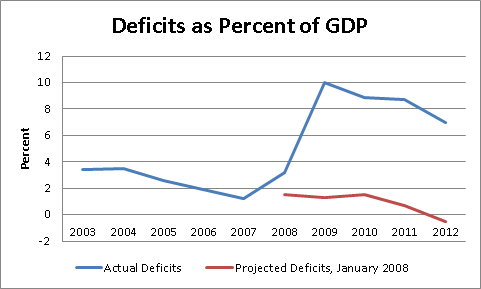October 26, 2012
Regular Washington Post readers know that the paper has long since abandoned the separation of news and opinion when it comes to promoting its views on Social Security, Medicare and the budget deficit. It again displayed its disdain for normal journalistic integrity with a front page piece trumpeting a study from National Association of Manufacturers (NAM) that warned of the dire consequences from the “fiscal cliff,” the Post’s sensationalist term for the scheduled ending of tax cuts and sequestration of spending at the end of the year.
The headline of the piece told readers that “‘fiscal cliff’ already hurting economy, report says.” While the article excludes the views of anyone who questioned the claims presented by NAM and its study, many of their assertions are implausible on their face. For example, the first sentence tells readers:
“The ‘fiscal cliff’ is still two months off, but the scheduled blast of tax hikes and spending cuts is already reverberating through the U.S. economy, hampering growth and, according to a new study, wiping out nearly 1 million jobs this year alone.”
This would correspond to a reduction in GDP growth for the year of approximately 0.7 percent. Presumably this falloff is all occurring in the 3rd and 4th quarter. (The Post and other news outlets would have been incredibly negligent if they had failed to report this extraordinary drag on growth in the first half of the year, if it were true.) That means that we are seeing a drag on GDP growth of approximately 1.5 percentage points of GDP in the second half of this year due to the concern over the tax and spending changes at the end of the year. In other words, the Post is telling us that GDP would be growing at around a 3.5 percent annual rate right now if not for the budget deal reached last summer. It would be interesting if they could find an economist not on the payroll of the NAM who would say something like this.
In presenting its list of horror stories about the budget situation the Post tells readers about Mike Kelly, the president and chief executive of Nanocerox, a defense contractor. The Post tells us that he claims to have “embarked on an aggressive cost-containment strategy nine months ago… laid off four of his 22 employees and converted them to contract workers, froze salaries, renegotiated health benefits and tightened controls on spending.”
Of course this may be due to the fact there are likely to be cutbacks in the military budget regardless of how the current budget dispute is resolved. In other words, these cutbacks may have nothing to do with the budget battles themselves but rather stem from Mr. Kelly’s assessment that Congress is likely to reduce funding for his product. These are exactly the sorts of cutbacks that advocates of deficit reduction want since they free up capital and labor for other purposes. The Post should have included the views of an advocate of lower deficits who could have pointed this fact out to readers.
The article also highlights the weakness in orders for new capital goods in recent months. This is likely related to uncertainty, but not necessarily of the sort implied by the Post. The tax treatment of investment is up for grabs in the current budget battles. It is possible that investment goods will be taxed at either a higher or lower rate in 2013. If businesses anticipate that the outcome of a deal will allow for a lower tax rate on new investment (for example expensing of capital goods), then they would have good reason to defer investment until after the budget dispute is resolved. While this may affect the timing of investment decisions, its net effect on the economy is likely to be minimal.
At one point the Post article referred to a call for tax increases and spending cuts by a number of CEOs which it described “as part of a long-term plan to tame the $16.2 trillion national debt. “Tame” is a word that is appropriate to dealing with wild animals. Newspapers would use terms like “limit” or “reduce” in reference to the debt.
This comment also may lead to the misleading view that the deficit has been a longstanding problem. In fact the deficits had just before the downturn had been fairly modest and were projected to remain modest long into the future. The reason that the deficits exploded was that economy collapsed as a result of the bursting of the housing bubble.

Source: Congressional Budget Office.
Finally, the Post never points out that the dire projections for a recession and a sharp uptick in unemployment assume that the higher taxes and lower rate of spending are left in place all year. These are not the predicted results of letting them take effect for a few days in January.







Comments